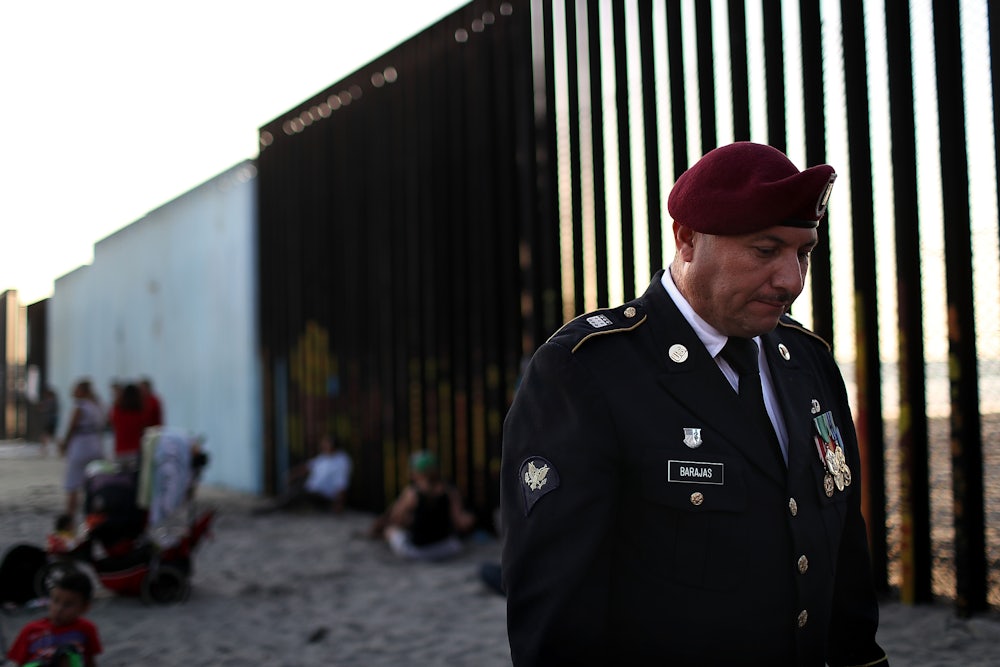Representative Louie Gohmert looked distressed—confused, even.
Just a few feet away on the House floor, a roll call vote was underway last Tuesday afternoon for the Veteran Service Recognition Act, which would protect U.S. military veterans from deportation and make it easier for deported veterans to come back to the U.S.
“As a general principle, if they fought for this country, you wouldn’t think they’d be deported if they served honorably,” said Gohmert, an eight-term MAGA Republican from Texas, before turning around and joining 208 of his GOP colleagues in voting against the bill, which passed with 220 votes, including three Republicans and every House Democrat except California’s Tony Cárdenas, who didn’t bother to vote.
Some veterans get deported for crimes committed during their service in the military, but most have run-ins with law enforcement after they are discharged. Infractions can range from criminal convictions for violent crimes and misdemeanors to simply being detained by immigration agents for not having legal status.
The bill had the backing of the American Legion, but even that wasn’t enough for Republicans, all but three of whom voted no. Representative Chip Roy, another MAGA member from Texas, winced when asked by The New Republic if veterans should be protected from deportation. “Obviously those people who wear the uniform, you want to give them significant credit for having done that,” he said—moments before voting against the veterans bill on the House floor.
House Minority Whip Steve Scalise stated the GOP position directly, albeit in question form. “Why you would want to give somebody a free pass to break America’s laws makes no sense,” he said.
But Hector Barajas takes issue with that line. “We’re not saying the person should get a get-out-of-jail-free card,” said Barajas, an Army veteran of the 82nd Airborne Division. Barajas, who served in the Army from 1995 to 2001, was then convicted the following year for shooting a gun at an occupied vehicle. He served two years in prison and was deported to Mexico twice between 2004 and 2010.
He now runs the Deported Veterans Support House in Tijuana, where many U.S. military veterans end up when the government they swore to serve and protect deports them after they’ve been convicted of crimes. Barajas has a list of nearly 500 deported veterans that he’s compiled since creating the support house in 2012. “They don’t ask you if you’re a veteran when you get to the immigrant detention centers, so there’s no way to know how many veterans have been deported,” said Barajas. He noted, “We all do our prison sentences,” meaning that their debts to society have been paid.
Migrants have fought on the frontlines of every American war. Around 45,000 noncitizens currently serve in the U.S. military and 700,000 foreign-born veterans live in the U.S., according to a 2020 analysis by Fwd.us.
Noncitizen enlistees can apply for a green card after one year of honorable service, but naturalizations of active duty military plummeted during the Trump administration after additional hurdles were thrown into the legalization process, like creating mandatory wait times before issuing the paperwork veterans need to file for citizenship, eliminating training and staff for enlistees to fill out their naturalization paperwork during basic training, and closing naturalization offices abroad where the military could process their applications.
While veterans technically retain some health care benefits even after they’ve been deported, access to Department of Veterans Affairs facilities is extremely limited outside of the U.S.
Another benefit that deported veterans retain is the right to be buried with a military funeral in the U.S. Barajas has attended nearly a dozen funerals of deported comrades who returned in a casket.
“You’ll have someone speak the words of ‘Duty, Honor, Country’ and it’s like, man, this person you’re putting in the ground wasn’t allowed to live in the country where you bury him,” said Barajas, his voice trailing off on the phone, before adding: “Look, this should just be a veterans’ issue. People should see these are veterans: They shouldn’t be deported. And that’s it.”
Representative Darrell Issa, an Army veteran, disagrees. In an extended interview in the Speaker’s Lobby during last week’s deported veterans vote, the 10-term California Republican told The New Republic that not all veterans deserve to be protected from deportation.
“The biggest failure of this bill is that it presumes you can give special treatment to somebody who didn’t serve honorably, and that’s simply a bad idea,” said Issa. The bill’s protections exclude military members who are dishonorably discharged from service.
To Issa, only veterans who receive honorable or general discharges should be protected from deportation, and bad conduct discharges are beyond the pale. “We know what it takes to get a bad conduct discharge,” he said. “It takes a real dirtbag.”
Barajas takes issue with Issa’s characterization of some of their deported comrades-in-arms. “Some people say you’re a dirtbag in the military, you’re a dirtbag when you get out; but again, I’m saying, you got a guy who does two, three tours in Iraq, then comes back and smokes weed because he’s got PTSD … not excusing criminal behavior, but they serve their time. They should not be deported,” said Barajas.
Conflating criminal law with immigration law is central to GOP talking points against the deported veterans bill. As Barajas points out, noncitizen veterans who are sentenced for crimes they commit do their time in prison like any other inmate.
I asked Congressman Dan Crenshaw, a Texas Republican and former Navy SEAL, if veterans should still be subjected to deportation upon release from prison. “That is extremely hypothetical,” said Crenshaw, adding that the deported veterans bill “makes it seem like there’s a problem too and it’s not clear that there really is.”
Despite GOP naysayers in the House, Congressman Mark Takano hasn’t given up hope that the bill can pass the Senate in the final weeks of the legislative calendar. The four-term California Democrat, who chairs the House Committee on Veterans’ Affairs, authored the deported veterans bill with help from Representative Zoe Lofgren, who chairs the House Judiciary Subcommittee on Immigration and Citizenship and is a close ally of Speaker Nancy Pelosi.
“We have a lot of senators for whom deporting an illegal immigrant is one thing, but deporting a veteran? That just doesn’t compute,” said Takano. “It’s a travesty that people who have worn the uniform for our country are being deported. It’s being conflated into an immigration issue, and it’s not. It’s really a veterans’ issue.”
The New Republic asked nearly a dozen lawmakers last week if veterans should be protected from deportation. Senator Cynthia Lummis said she was unaware of the issue. Senator Kyrsten Sinema said she’d look into it. So did Senator Jon Ossoff.
“My sympathies would be very much aligned with not deporting an individual who has served, has an honorable discharge, and is leading a constructive life here,” said Senator Jack Reed, the longtime chairman of the Senate Committee on Armed Services.
Some very conservative senators echoed Reed. Senator Ron Johnson, a Wisconsin Republican, expressed a sympathetic position. So did Alabama Republican Senator Tommy Tuberville. “If anybody deserves an opportunity to not be deported, it would obviously be somebody who served their time in the military. There’s gotta be a process for that. That’s the reason we’re up here: to do stuff like that,” said the former Auburn football coach.
Meanwhile, for deported veterans like Barajas, who returned to the U.S. and eventually became a citizen in 2018, the challenge noncitizen military members face begins in basic training. “In the military there is a process to becoming a citizen, but there’s no program,” said Barajas.
“I say as soon as you join, and you can start your process, you should be a citizen before you get sent off to war,” Barajas continued. “We have a program for teaching people how to service and fire their weapon, how to exercise a power of attorney, and how to fill out their insurance paperwork. We need a program so that everyone goes through an informative process on becoming a citizen and the consequences of not filing their paperwork. Like having your vehicles mission ready for a deployment to war, having your citizenship to deploy into civilian life is also mission critical.”






